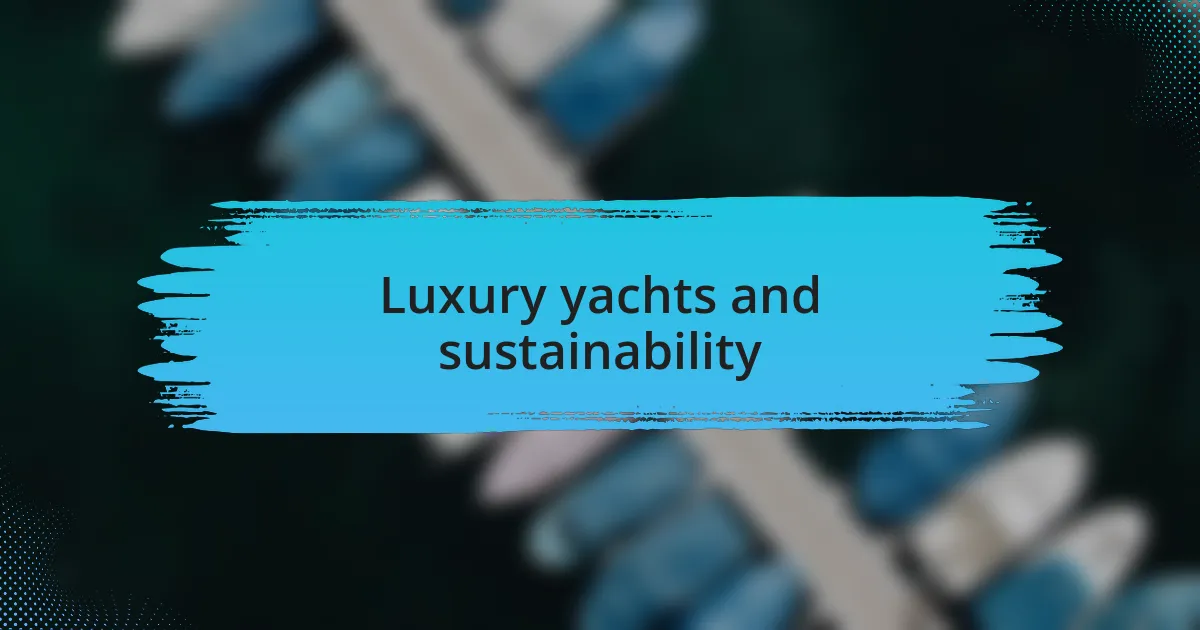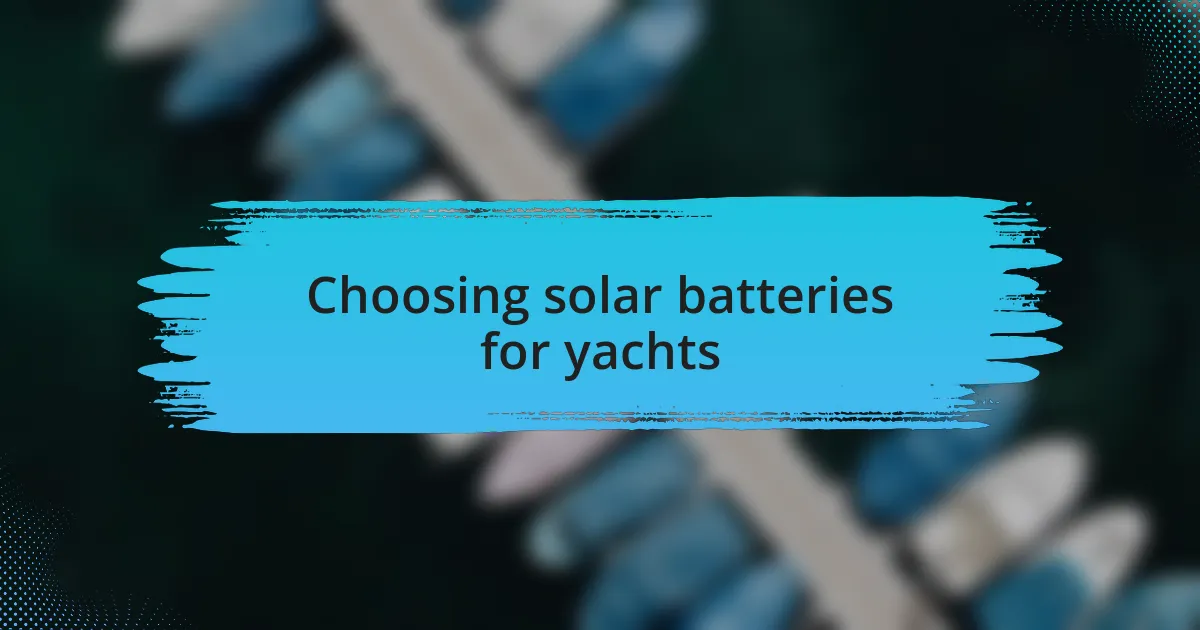Key takeaways:
- Understanding the differences between lithium-ion and lead-acid batteries is crucial for maximizing energy storage and performance on yachts.
- Solar batteries provide energy independence, reduce carbon footprint, and create long-term cost savings for yacht owners.
- Integration of sustainable practices in luxury yachting is becoming essential, with innovations in materials and energy sources reflecting environmental responsibility.
- When choosing solar batteries, consider factors like capacity, durability, weight, size, and warranties to ensure optimal performance at sea.

Understanding solar battery options
When it comes to solar battery options, understanding the types available is crucial for optimal energy storage on luxury yachts. I remember when I first explored lithium-ion batteries; their efficiency and longevity blew me away. They offer a significant weight advantage and require less space, which is essential for maximizing the limited area on a yacht.
On the other hand, lead-acid batteries, while more affordable upfront, often don’t provide the same cycle life as their lithium counterparts. Have you ever considered the impact of weight and space constraints on your boating experience? I experienced firsthand how mounting a heavier battery system can affect a yacht’s performance—less agility in the water was a reality I hadn’t anticipated.
Lastly, I find the emerging technologies in solar batteries fascinating, like flow batteries, which promise to bridge some gaps in capacity and recharge times. The question I often ponder is, how far are we willing to go for sustainability in luxury contexts? Personally, the potential for integrating these innovative solutions into high-end yachts excites me, reflecting a fusion of performance and environmental responsibility that resonates deeply with today’s luxury buyers.

Benefits of solar batteries
One of the standout benefits of solar batteries is their ability to provide energy independence while out at sea. I remember the first time our yacht was anchored offshore, and the sun began to set. The tranquility of knowing we had a reliable power source stored up for the night was exhilarating. Not having to rely on a noisy generator changed the whole atmosphere on board, allowing us to enjoy the sounds of the waves instead.
Further, there’s something deeply satisfying about minimizing our carbon footprint while enjoying the luxury of yachting. This was vividly illustrated during a recent trip when we spent days at anchor, and the solar batteries kept everything running smoothly—lights, refrigeration, and even entertainment systems. Can you imagine the level of comfort that comes with harnessing the sun’s energy? For me, it was both a comforting and empowering experience, knowing we were treading lightly on the environment.
Moreover, the long-term cost savings associated with solar batteries can be significant. Initially, I was hesitant about the investment, but after calculating fuel savings and reduced maintenance, the financial sense became crystal clear. Have you ever weighed the upfront costs against the long-term benefits? In my experience, the initial expense pays off quickly, particularly as I watched our reliance on traditional fuel sources diminish day by day.

Luxury yachts and sustainability
When it comes to luxury yachts, the integration of sustainable practices is not just a trend; it’s a growing necessity. I recall a moment sailing through the azure waters, feeling an incredible sense of pride as I looked around at fellow yachts utilizing solar energy. Witnessing this shift made me realize that indulgence can coexist with environmental responsibility, creating a new standard for luxury.
Sustainability on yachts is increasingly influencing design and technology choices. It was fascinating to see how some builders are incorporating materials like recycled aluminum and eco-friendly composites into their vessels. This transformation didn’t just appeal to my desire for exquisite aesthetics; it highlighted a purposeful commitment to preserving our oceans and resources.
As we advance toward a greener yachting experience, the community is becoming more engaged in sustainability discussions. It’s heartwarming to chat with fellow yacht owners about ways to reduce waste and utilize innovative technologies, like energy-efficient lighting and smart water systems. Have you ever considered how small changes can lead to monumental shifts? For me, these conversations have been an eye-opener, igniting a passion for creating a more responsible yachting lifestyle.

Choosing solar batteries for yachts
When choosing solar batteries for yachts, it’s essential to consider their capacity and depth of discharge. I remember the first time I set up my yacht with solar power; I meticulously calculated how much energy I used daily and upgraded the battery system accordingly. Have you ever faced the disappointment of running out of power when you least expect it? Ensuring you have a robust battery system can make all the difference in smooth sailing.
Durability is another critical factor in battery selection, especially in the marine environment. My experience with lithium-ion batteries has taught me about their impressive efficiency and lifespan compared to traditional lead-acid options. It’s reassuring to know these batteries can withstand the saltwater spray and temperature fluctuations that come with life at sea.
Finally, I recommend considering the installation of smart monitoring systems. I can’t stress enough the value these systems add; they allow me to track energy levels and manage power effectively from my smartphone. Isn’t it incredible how technology can empower us to take control of our energy consumption, even while cruising the open waters?

Comparing solar battery brands
When comparing solar battery brands, I always find it helpful to look at their warranties and performance guarantees. For instance, I once chose a brand that promised a 10-year warranty, which gave me a sense of security and assurance while cruising. Have you ever invested in a product only to be left high and dry when things went wrong? A strong warranty can be a game-changer, offering peace of mind for yacht owners.
Another consideration is the weight and size of the batteries—especially on a yacht where space is at a premium. I vividly recall a time when I opted for a compact battery that fit perfectly in a tight compartment, greatly improving my storage situation. Could you imagine dealing with bulky batteries that disrupt your yacht’s balance and aesthetics? Evaluating each brand’s specifications in terms of weight and dimensions quickly reveals which options are truly designed for yacht applications.
Lastly, customer reviews and support are crucial in making an informed decision. I often look for brands with responsive customer service; during my last sailing trip, I reached out for troubleshooting help and was pleasantly surprised at the prompt assistance I received. Isn’t it comforting to know that if something goes awry out at sea, you’re backed by a brand that truly stands behind its products? Taking these factors into account allows you to choose a battery that enhances your luxurious yachting experience.

My favorite solar battery choice
When it comes to my favorite solar battery choice, I lean towards lithium-ion batteries. I remember the first time I installed one on my yacht; the difference in efficiency was immediately noticeable. When I switched from traditional lead-acid batteries to lithium, it felt like I had a whole new power system, enabling longer trips without the constant worry about draining the battery.
Another reason I favor these lithium options is their impressive weight-to-energy ratio. On one sailing adventure, I had the pleasure of seeing how much lighter my setup became. It was refreshing to feel the yacht’s performance improve, with less strain on the engine and better fuel efficiency. Have you ever experienced that liberating feeling when everything clicks into place? That’s what I felt as I sailed smoothly, enjoying the sheer freedom offered by a well-optimized battery system.
Lastly, lifespan is a significant factor that solidifies my choice. Knowing that a quality lithium-ion battery can last up to 15 years with proper care truly excites me. I recall my friend investing in a cheaper alternative, only to replace it after just a couple of years. And let me tell you, the frustration of redoing the same task isn’t something any yacht owner enjoys. Who wouldn’t prefer the reliability of a long-lasting solution? This experience has taught me the value of investing wisely for the best outcomes at sea.